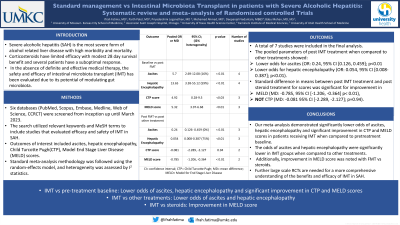Tuesday Poster Session
Category: Liver
P3834 - Standard Management vs Intestinal Microbiota Transplant in Patients with Severe Alcoholic Hepatitis: Systematic Review and Meta-Analysis
Tuesday, October 24, 2023
10:30 AM - 4:00 PM PT
Location: Exhibit Hall


Ifrah Fatima, MD
University of Missouri-Kansas City
Kansas City, MO
Presenting Author(s)
Ifrah Fatima, MD1, Parth Patel, MD2, Priyadarshini Loganathan, MD3, Mohamed Ahmed, MD4, Deepanjali Vedantam, MBBS5, Babu Mohan, MD, MS6
1University of Missouri-Kansas City, Kansas City, MO; 2Ascension Saint Joseph Hospital, Chicago, IL; 3University of Texas Health Science Center, San Antonio, TX; 4University of Missouri Kansas City, Overland Park, KS; 5Kamineni Institute of Medical Sciences, Hyderabad, Telangana, India; 6University of Utah Health School of Medicine, Salt Lake City, UT
Introduction: Severe alcoholic hepatitis (SAH) is the most severe form of alcohol related liver disease with high morbidity and mortality. Corticosteroids have limited efficacy with modest 28 day survival benefit and several patients have a suboptimal response. In the absence of definite and effective medical therapy, the safety and efficacy of intestinal microbiota transplant (IMT) has been evaluated due to its potential of modulating gut microbiota.
Methods: Six databases (Pubmed, Scopus, Embase, Medline, Web of Science, CCRCT) were screened from inception up until March 2023. The search utilized relevant keywords and MeSH terms to include studies that evaluated the efficacy and safety of IMT in SAH. Outcomes of interest included ascites, hepatic encephalopathy, Child Pugh Turcotte(CTP), Model End Stage Liver Disease (MELD) scores. Standard meta-analysis methodology was followed using the random-effects model, and heterogeneity was assessed by I2 statistics.
Results: A total of 7 studies were included in the final analysis. The pooled parameters of post IMT treatment when compared to other treatments showed significantly lower odds for ascites (OR: 0.24, 95% CI [0.126, 0.459]; p< 0.01) and hepatic encephalopathy (OR: 0.054, 95% CI [0.008-0.387]; p< 0.01). Standard difference in means between post IMT treatment and post steroid treatment for scores was significant for improvement in MELD (MD: -0.785, 95% CI [-1.206, -0.364] p< 0.01), but not CTP (MD: -0.081 95% CI [-2.289, -2.127]; p=0.94).
Discussion: Our meta-analysis demonstrated significantly lower odds of ascites, hepatic encephalopathy, and significant improvement in CTP and MELD scores in patients receiving IMT when compared to the pretreatment baseline. The odds of ascites and hepatic encephalopathy were significantly lower in IMT groups when compared to other treatments. Additionally, improvement in MELD score was noted with FMT vs steroids. Further large-scale RCTs are needed for a more comprehensive understanding of the benefits and efficacy of IMT in SAH.
Disclosures:
Ifrah Fatima, MD1, Parth Patel, MD2, Priyadarshini Loganathan, MD3, Mohamed Ahmed, MD4, Deepanjali Vedantam, MBBS5, Babu Mohan, MD, MS6. P3834 - Standard Management vs Intestinal Microbiota Transplant in Patients with Severe Alcoholic Hepatitis: Systematic Review and Meta-Analysis, ACG 2023 Annual Scientific Meeting Abstracts. Vancouver, BC, Canada: American College of Gastroenterology.
1University of Missouri-Kansas City, Kansas City, MO; 2Ascension Saint Joseph Hospital, Chicago, IL; 3University of Texas Health Science Center, San Antonio, TX; 4University of Missouri Kansas City, Overland Park, KS; 5Kamineni Institute of Medical Sciences, Hyderabad, Telangana, India; 6University of Utah Health School of Medicine, Salt Lake City, UT
Introduction: Severe alcoholic hepatitis (SAH) is the most severe form of alcohol related liver disease with high morbidity and mortality. Corticosteroids have limited efficacy with modest 28 day survival benefit and several patients have a suboptimal response. In the absence of definite and effective medical therapy, the safety and efficacy of intestinal microbiota transplant (IMT) has been evaluated due to its potential of modulating gut microbiota.
Methods: Six databases (Pubmed, Scopus, Embase, Medline, Web of Science, CCRCT) were screened from inception up until March 2023. The search utilized relevant keywords and MeSH terms to include studies that evaluated the efficacy and safety of IMT in SAH. Outcomes of interest included ascites, hepatic encephalopathy, Child Pugh Turcotte(CTP), Model End Stage Liver Disease (MELD) scores. Standard meta-analysis methodology was followed using the random-effects model, and heterogeneity was assessed by I2 statistics.
Results: A total of 7 studies were included in the final analysis. The pooled parameters of post IMT treatment when compared to other treatments showed significantly lower odds for ascites (OR: 0.24, 95% CI [0.126, 0.459]; p< 0.01) and hepatic encephalopathy (OR: 0.054, 95% CI [0.008-0.387]; p< 0.01). Standard difference in means between post IMT treatment and post steroid treatment for scores was significant for improvement in MELD (MD: -0.785, 95% CI [-1.206, -0.364] p< 0.01), but not CTP (MD: -0.081 95% CI [-2.289, -2.127]; p=0.94).
Discussion: Our meta-analysis demonstrated significantly lower odds of ascites, hepatic encephalopathy, and significant improvement in CTP and MELD scores in patients receiving IMT when compared to the pretreatment baseline. The odds of ascites and hepatic encephalopathy were significantly lower in IMT groups when compared to other treatments. Additionally, improvement in MELD score was noted with FMT vs steroids. Further large-scale RCTs are needed for a more comprehensive understanding of the benefits and efficacy of IMT in SAH.
Disclosures:
Ifrah Fatima indicated no relevant financial relationships.
Parth Patel indicated no relevant financial relationships.
Priyadarshini Loganathan indicated no relevant financial relationships.
Mohamed Ahmed indicated no relevant financial relationships.
Deepanjali Vedantam indicated no relevant financial relationships.
Babu Mohan indicated no relevant financial relationships.
Ifrah Fatima, MD1, Parth Patel, MD2, Priyadarshini Loganathan, MD3, Mohamed Ahmed, MD4, Deepanjali Vedantam, MBBS5, Babu Mohan, MD, MS6. P3834 - Standard Management vs Intestinal Microbiota Transplant in Patients with Severe Alcoholic Hepatitis: Systematic Review and Meta-Analysis, ACG 2023 Annual Scientific Meeting Abstracts. Vancouver, BC, Canada: American College of Gastroenterology.
